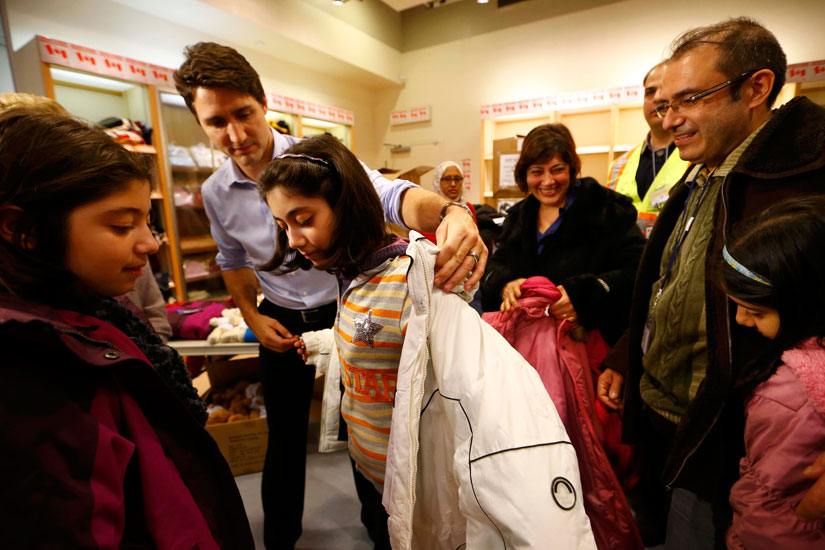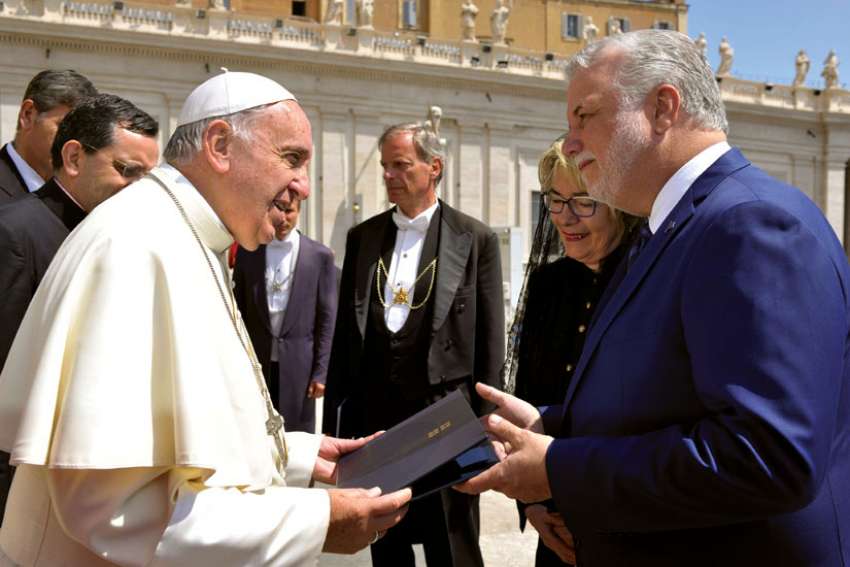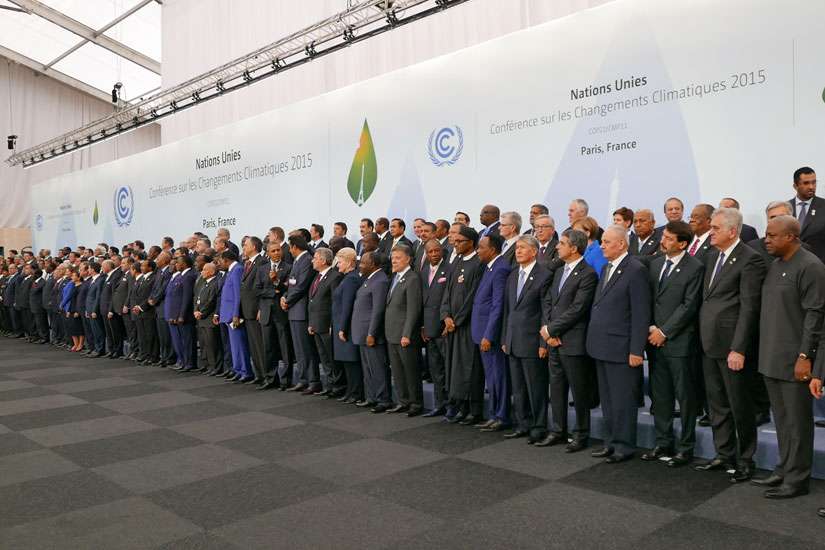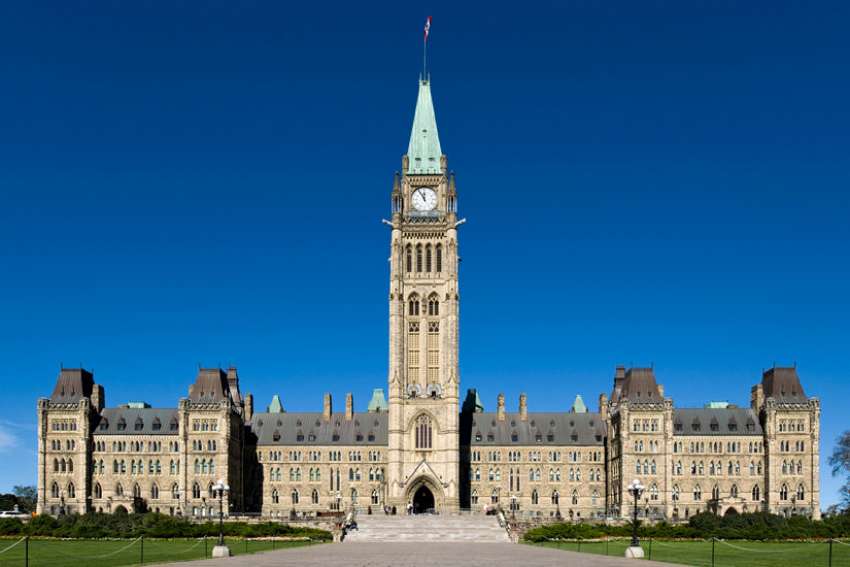The new Liberal government of Justin Trudeau began 2016 fresh out of the gate from their 2015 election victory with ambitious plans on climate change, on welcoming 25,000 Syrian refugees, and on stimulating the economy and helping the middle class.
It was assisted suicide that took centre stage, however, as the government dealt with the Supreme Court of Canada’s Carter decision of February 2015 that struck down sections of the Criminal Code on assisted suicide and gave the government a year to form legislation around the decision.
Like the previous government, the Liberals could have opted for the Constitution’s notwithstanding clause to suspend the decision for five years and the prohibition against euthanasia and assisted suicide.
Early in 2016, the government obtained a four-month extension on the Carter decision deadline and convened a joint-Parliamentary Committee on Physician-Assisted Dying (PADM). The PADM recommended making euthanasia open to mature minors under 18 and to those suffering with mental illness, going well beyond Quebec’s legislation that restricted euthanasia to the terminally ill.
The government’s Bill C-14, however, resisted the wide open recommendations and restricted availability of euthanasia and assisted suicide to those whose death is “reasonably foreseeable” and 18 years old or older.
The battle to widen the criteria for eligibility for euthanasia continues, both in the courts and in promised study by the federal government built into the legislation.
The federal bill left conscience protections to the provinces and the various colleges that govern health care professionals. That means in some provinces, like Ontario, doctors could be forced to make effective referrals and even kill patients in some circumstances or risk losing their license.
Here are some of the other top stories on the political front:
Refugees
During the 2015 federal election, the Liberals promised to bring in 25,000 Syrian refugees by Christmas.
It pushed the deadline to March 2016 and poured resources into fast-tracking refugees identified by the United Nations as among the most vulnerable in UN refugee camps. The government refused to recognize the genocide Christians and other religious minorities were facing in the region, though it did recognize the extra vulnerability of the LGBT community.
By November, Canada had welcomed 30,000 Syrian refugees and another 20,000 are being processed. Many, however, had already been in the pipeline through private sponsorships promoted during the Harper government.
Fifty-seven per cent of the Syrian refugees, or 17,627 people, were government-sponsored. Most of the rest were privately-sponsored, many by Catholic parishes.
While most observers praise the effort, it was not without snags. Private sponsorship groups sometimes found themselves waiting as long as a year to receive their refugee family, after paying rent on leased apartments.
As government funding and private sponsorship money runs out, many refugee families face new hurdles in obtaining provincial welfare if they are not self-sufficient.
The focus on Syrian refugees also meant refugees from other parts of the world faced even longer processing times.
 A young Syrian refugee is greeted by Canadian Prime Minister Justin Trudeau after arriving Dec. 10, 2015 from Beirut at the Toronto Pearson International Airport. (CNS photo/Mark Blinch, Reuters)
A young Syrian refugee is greeted by Canadian Prime Minister Justin Trudeau after arriving Dec. 10, 2015 from Beirut at the Toronto Pearson International Airport. (CNS photo/Mark Blinch, Reuters)
Climate change
The Liberals entered 2016 with big promises to meet or exceed its international commitments to reduce carbon emissions.
The government announced $2.65 billion over five years to help countries in the developing world deal with climate change.
In October, the Liberals ratified the Paris Climate Change accord even prior to gaining the assent of the provinces, promising in October to impose carbon pricing on any provinces that did not put in their own cap and trade or carbon tax scheme.
In December, following a First Ministers meeting, the various levels of government agreed to make “historic investments in green infrastructure, public transit and clean technology and innovation.”
The provinces, territories and federal government also committed to working with Indigenous peoples to mitigate the effects of climate change.
The Canadian Catholic Organization for Development and Peace has been urging the government to help small farmers to adapt to climate change in the developing world.
Truth and Reconciliation
The Liberals promised to implement all of the Calls to Action put forward by the Truth and Reconciliation Commission (TRC), even though some, such as an apology from the Pope on Canadian soil, were beyond its ability to carry out.
The Canadian Conference of Catholic Bishops and other Church groups responded to Calls to Action specifically related to churches. These included producing plans on how they would educate their people on the United Nations Declaration on the Rights of Indigenous Peoples and repudiate doctrines that seemed to give European colonists the right to Indigenous lands.
Though Pope Francis has informed the Canadian bishops he will not be visiting Canada in 2017, he has left open the possibility of a trip in 2018 or '19. Saskatchewan bishops, Indigenous leaders and government officials are among those hoping to see the pope come to the province to make the apology.
The Prime Minister named former TRC chairman Justice Murray Sinclair to the Senate in March.
 Pope Francis accepts an official invitation to visit Montreal from Quebec Premier Philippe Couillard during his general audience in St. Peter’s Square at the Vatican May 27. The Pope was invited to visit Montreal in 2017 for the city’s 375th anniversary. (CNS photo/L’Osservatore Romano, handout)
Pope Francis accepts an official invitation to visit Montreal from Quebec Premier Philippe Couillard during his general audience in St. Peter’s Square at the Vatican May 27. The Pope was invited to visit Montreal in 2017 for the city’s 375th anniversary. (CNS photo/L’Osservatore Romano, handout)
The economy
The Liberals campaigned on a promise to stimulate the economy through investment, including the possibility of a modest budget deficit of around $5 billion.
The Trudeau government’s first federal budget in March, however, came in with an almost $30 billion deficit. With low interest rates and Canada’s low debt-to-GDP ratio relative to other G7 countries, most independent analysts did not express alarm.
The Canada Child Benefit won praise from a range of pro-family sources. It would give the average family an extra $2,300 a year per child under six, with up to $6,400 per child for families with less than $30,000 net income. The budget, however, ended income-splitting for families that allowed a single-earner family to be taxed at the same level as a dual-earner family with the same income.
The Canada Child Benefit was deemed to be a poverty-reduction measure. The budget also included $2.3 billion investment in affordable housing over two-years; and $8.3 billion to help Indigenous communities.
Towards the end of the year, the government showed signs its spending spree might be over when it told the provinces it would hold the line at a three per cent increase in healthcare funding.
Religious Freedom
The Liberal government abolished the free-standing Office of Religious Freedom and replaced it with the Global Affairs Office of Freedom, Human Rights and Inclusion.
The new office has three times the budget at $15 million a year and no ambassador. Former Ambassador of Religious Freedom Andrew Bennett told the Senate human rights committee the country’s focus on religious freedom has “diminished” with the change.
Religious freedom is an internationally-recognized human right, while inclusion is a vague term that can be easily politicized, he said.
Bennett is now a senior fellow at the Cardus Think Tank, and chair of the Cabinet of Canadians for Cardus’ Faith in Canada 150 program, to mark the 150th anniversary of Confederation in 2017.
 Heads of delegations at the 2015 United Nations Climate Change Conference (COP21), which led to the signing of the Paris Agreement, Nov. 30, 2015. (Photo courtesy of Presidencia de la República Mexicana, Wikimedia Commons)
Heads of delegations at the 2015 United Nations Climate Change Conference (COP21), which led to the signing of the Paris Agreement, Nov. 30, 2015. (Photo courtesy of Presidencia de la República Mexicana, Wikimedia Commons)
Transgender Bill
In May, the Attorney General of Canada, Jody Wilson-Raybould, surrounded by members and supporters of the transgender community, introduced Bill C-16 to add gender identity and expression to the Canadian Human Rights Act and the Criminal Code provisions governing hate speech.
The bill had support on both sides of the House, including many Conservatives who said it is only adding to the federal legislation what exists in most provincial human rights codes. The bill sailed through the Justice Committee, which heard no witnesses except the Attorney General, and is now before the Senate where it is being debated.
Though the bill may face a rougher ride in the Senate it is expected to pass and become law in the New Year.
Palliative Care
The government has indicated it will support Conservative MP Marilyn Gladu’s private member’s bill C-277 that would see Canada establish with the provinces and territories a framework for the effective delivery of palliative care to Canadians.
Though the government has earmarked about $3 billion for home care, the passage of this bill could go a long way to ensuring Canadians have access to end-of-life care in hospices, at home or in hospital that ensures their comfort. Only an estimated 30 per cent of Canadians have access to quality palliative care.
Though Bill C-277 was scheduled for its second and final hour of debate and unanimous consent on Dec. 13, it has been postponed until the next available opportunity, which is likely the first week of February. The bill will also examine whether palliative care should be included in the Canada Health Act.


